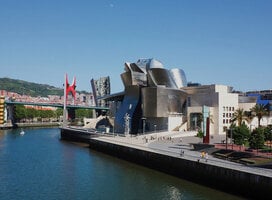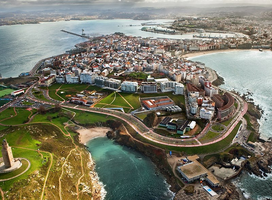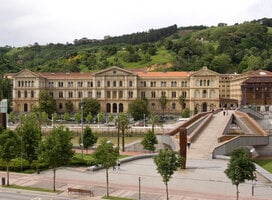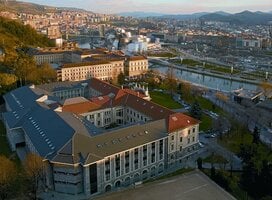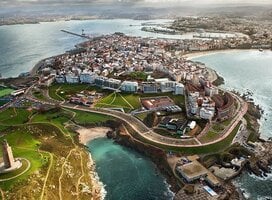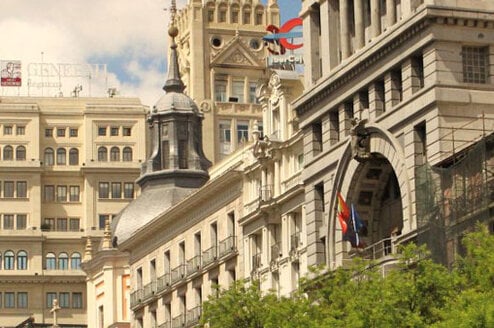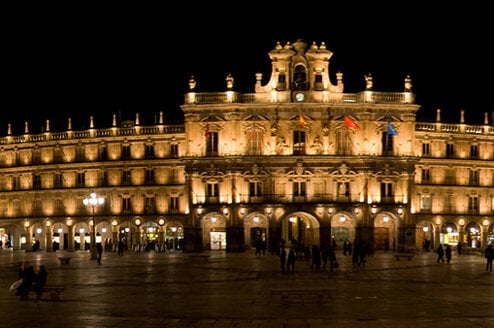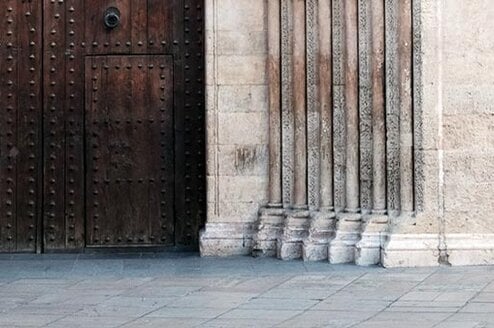Study Abroad Programs in Bilbao
Located in northern Spain, within País Vasco, Bilbao is a cosmopolitan city and a leader in business, culture and fine arts, which makes for an ideal study abroad location. With its combination of cosmopolitan activities -- art and history museums, sightseeing, shopping, and cafe-going -- and outdoor activities -- including hiking, surfing, kayaking, and biking -- , any person can find activities of interest in this city.
Bilbao has many pedestrian areas, including the old quarter with shops, restaurants, and coffee houses, as well as a bike path along the riverfront and through the main street of town. Bilbao is home to two top-notch universities, the Universidad del País Vasco and the Universidad de Deusto, both which offer a wide variety subject areas, have an abundance of international students, and are connected to third-party providers that are well-known in the study abroad sphere.
Anything you're hoping to study or experience during your study abroad experience can likely be found in Bilbao!
Located just minutes from the coast, Bilbao is a cosmopolitan epicenter of both Spanish and Basque culture. Bilbao is known to have one of Europe's fastest growing art scenes, with the famous Guggenheim Museum, a world-renowned cuisine, beautiful beaches nearby on the coast, and winding medieval streets in the historical city center.
Culture & Immersion
Studying in Bilbao will provide many opportunities to immerse yourself in the rich culture, particularly though your host family, study abroad program, and university activities. Many programs offer opportunities for language exchange, through which local and international students will come together to share their knowledge of Spanish and learn English in exchange.
Additionally, The Universidad de Deusto offers students the opportunity to participate in a service learning project during their semester or academic year in Bilbao, which will allow students to interact with native Spanish speakers, meet needs within the community, and increase awareness and commitment to social justice issues. There will be opportunities to get involved in other clubs, sports, and internships though your host university as well.
Culture Shock & Support
While culture shock is natural when studying in a new country, and adjusting to the language may pose a particular challenge, study abroad programs in Bilbao are well-suited to help students with the adjustment.
Most study abroad programs offer pre-departure advising to guide students through the application process and help prepare for arrival on-site. Once in Bilbao, programs have on-site orientations during the first week of the academic program, which include tours of the city, practical information about life in the host city, including transportation, safety and local culture, and a chance to meet the other students in your program. Throughout the duration of your studies in Bilbao, program staff will be available on-site to provide any sort of guidance, and your host family, should you choose to live with one, will also be in important support system, helping you to acclimate to the new culture and gain confidence in your Spanish-speaking.
Lifestyle
Spain is known for its relaxed pace of life, for which Bilbao is no exception. Lunch is the heaviest meal of the day and is typically eaten between 2 p.m. and 4 p.m. Each day in Bilbao consists of a siesta following lunch, during which the city will shut down for an hour or two in the early afternoon. This is a great time for students to rest or relax at home or enjoy some café or churros at a local coffee shop. Dinner is eaten between 9 p.m. and 11 p.m. and is typically a much lighter meal. Spain is also known for it's late night hours, and nightlife in Bilbao tends to start later in the evening and the liveliness continues well into the morning hours.
Insider Tips
- As País Vasco is a global gastronomical center, cuisine is a major part of the lifestyle and you will want to try all of the culinary treasures this region has to offer.
- Fútbol is a way of life in Spain, and you can expect to find yourself heading to the local pub or bar to watch Atletico Bilbao, Bilbao's soccer team, or catching a game at their newly renovated stadium in the city center.
- Bilbao is filled with public parks and waterways that are always open for exploring or kayaking.
- Just minutes from the coast, Bilbao's accessible public transportation makes it easy for students to explore the beaches of Northern Spain. Bilbao also has a modern airport which makes for easy travel to other destination throughout Spain and the rest of Europe.
When planning your study abroad semester or year, one of the most important factors to consider is which host university you prefer. The two options are the Universidad del País Vasco or at the Universidad de Deusto.
Both universities are prestigious; Universidad del País Vasco is ranked highly among world universities in academics and research and has campuses spread throughout the region of País Vasco, including one in downtown Bilbao, while the Universidad de Deusto is Spain's first and one of its most prestigious private universities, with a strong commitment to international students. Each university has its own specialties in areas of study and course offerings, so you'll want to look into these specifics in order to decide which school is best for you.
Course Types
The most common way to enroll in study abroad in Bilbao is through a third-party provider. Well-renowned study abroad providers have programs in Bilbao, offering enrollment in courses at the Universidad del País Vasco or at the Universidad de Deusto.
It is also possible to study at these universities through direct enrollment or direct exchange, but you will need to make sure these options are accepted by your home university and that your course credits from Bilbao will be transferable.
Popular areas of study at both local universities include business, engineering, Spanish language and culture, and international relations, although both schools offer a wide variety of subject areas.
Housing
Living in a homestay is the most common option for accommodation while studying in Bilbao. Almost all programs offer homestay as an option, which typically includes three meals a day, laundry service, wifi, and a private room. All homes that students are placed in are convenient to the university, either within Bilbao or in the nearby town of Gexto, which is a 20-25 minute commute on the metro.
Living with a host family provides the best opportunity for cultural and language immersion, however, if this option is not for you, most programs also allow students to live in apartments. Housing in apartments offers more independence, as well as responsibility for all your own meals. Apartments will likely be shared with other students, either Americans, Spanish, or other internationals.
Transportation
Much of central Bilbao is easily accessible on foot, but there are also many other transportation options to help you access the greater Bilbao area. Bilbao has a modern and efficient metro system with two lines, 43 "Bilbobus" lines that can take you all over the city and greater-Bilbao area, a tram system opened in 2002 that runs throughout the city center, and taxis readily available throughout the city. Students can purchase subway and bus passes at a reduced monthly cost.
Bilbao is not the cheapest city to live in, but it is definitely possible to live there on a budget. An important factor to consider in your budgeting is that living with a host family will include three meals a day and laundry services -- if you choose to live with a host family, it will definitely save you some budgeting on those expenses.
You can also help keep yourself on a budget by taking full advantage of public spaces and events throughout Bilbao, such as the public parks and festivals, as well as events and activities that are included in your program or university. If you take advantage of all these opportunities, you can find yourself with a lot to do without needing to spend too much money.
Cost of Livings
The cost of living in Bilbao is quite similar to that of popular metropolitan areas in the US. You can purchase a monthly public transit pass for under $50, and expect to budget $15-$25 for a decent meal at a restaurant. Make sure to keep a student ID with you as this can provide you with discounts for expenses such as public transportation and museum entry. If you choose to live with a host family, you will likely have three meals a day and laundry included in your program cost, meaning you won't have to budget for those expenses.
Visas
If your academic program in Bilbao lasts longer than 90 days (which most do), you will be required as a US passport holder to obtain a student visa through a Spanish consulate/embassy prior to departure. The visa process can take 4-6 weeks or longer to complete, so it's crucial to leave ample time to get this done before your departure.
If you are not a U.S. citizen, you should contact your consulate to verify specific entry requirements for Spain.
Can You Work While Studying in Bilbao?
It is definitely possible to work while studying in Bilbao. One common option is to work as a caretaker for children. It's also possible to find work at local businesses. You will just need to be sure that you can work around whatever your course schedule might be. If you are not as concerned about making money but still interested in gaining work experience, there are plenty of options for internships (likely unpaid) and volunteer work, and either your program or host university will be able to connect you with an opportunity in your area of interest.
Scholarships
There are plenty of options of scholarships to apply to that can supplement or cover your studies in Bilbao. Most third-party providers offer their own scholarships that students can apply for, which is a common way for students to get funding for their study abroad. You should look into your study abroad program to find out more about their own scholarships. Another option is to apply for external scholarships, such as the Benjamin A. Gilman International Scholarship or the Boren Awards for International Study which are two popular options among many.
Study Abroad Programs in Bilbao
What People Are Saying
Related Study Abroad Articles
Frequently Asked Questions
-
Is it safe to live in Spain?
Spain is a very safe country. But, just like the rest of Europe, Spain is notorious for pickpockets. It's important to not carry your passport around and always keep an eye on your phone!
-
How long does it take to get a Spain student visa?
Processing your visa application takes the consulate about 4 weeks. The most lengthy part of the process is collecting all of the documents and securing an appointment. For some consulates it is very difficult to secure an appointment, so it is best to plan ahead.
The documents needed to apply for a student visa are:
- National visa application form + photocopy
- Original passport + photocopy
- One recent passport sized photo (to be attached to the form)
- Copy of the acceptance letter from the Spanish University (in Spanish or with Spanish translation)
- Evidence of funds (could be a statement from the University describing housing or a notarized letter from your parents assuming financial responsibility)
- Proof of health insurance
- Medical certificate (only need for stays longer than 180 days)
- Express mail envelope with pre-paid stamps addressed to yourself with which the consulate may return your passport with the visa
Related Content

